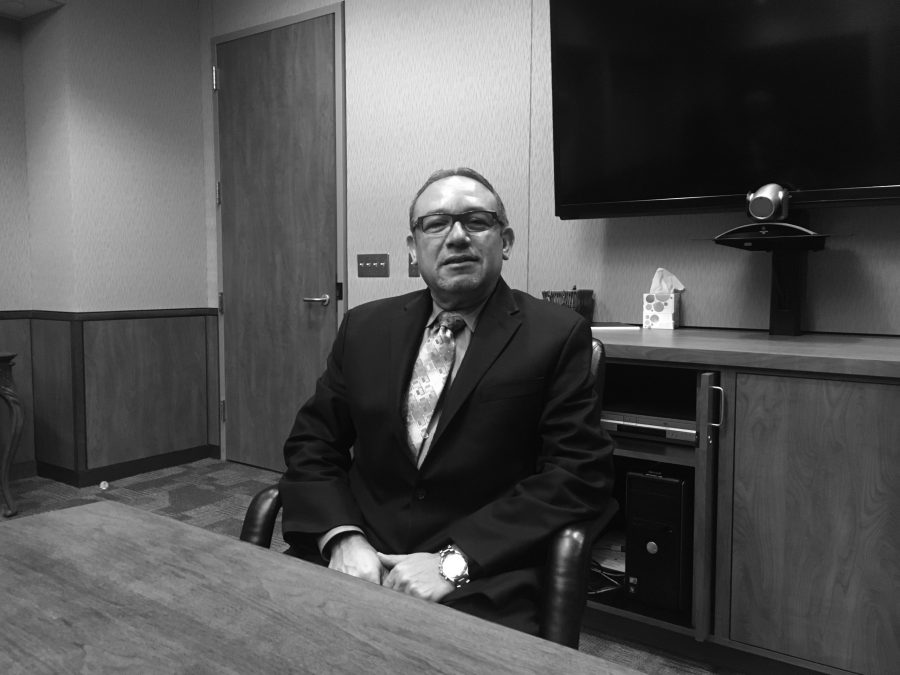The Paisano sat with Interim President Dr. Pedro Reyes to get his take on UTSA, its future and his role at the university.
Interview conducted by Isaac Serna & Samuel DeLeon
Q: How would you describe your first day as interim president at UTSA?
It was a pleasant day for me. Meeting all the colleagues that I’ve been working with for a long time and thinking about how can we move forward and position the university to accomplish its goal.
Q: Are you a candidate for UTSA president?
I am not. It’s not that I don’t want to do it, but I just need to take a little break to rethink, re-energize and come back with new ideas. I think it’s really important for any administrator. In fact, my rule is that we ought to just do five years, six years and get somebody else to re-energize the place. That’s why I would want to re-energize and get to my work a little bit and then, if I have an opportunity to come back I will definitely do it. I love this city, I love this institution. This would’ve been my dream job if I had been already a little bit away from administration.
Q: What qualities would you like to see in the next president of the university?
UTSA needs a person of high integrity who is willing to work with the community, who understands human relationships and can make decisions for the good of the institution. Also, it’s important that UTSA has somebody who helps cultivate the next generation of leaders.
Q: Did you say you had a past relationship with UTSA?
Yes, during my 14 years at the UT System and academic affairs I, in many ways, helped the former president bring in new proposals to grow UTSA in terms of enrollment, buildings, facilities, laboratories and faculty, so I feel like I’m really part of this institution.
Q: You’ve raised over $22 million in research and development funds. What’s your secret to the fundraising?
I had the pleasure of working with some really good people at UT Austin and other places. As a grad student I was trained to specialize in research and development, so I learned the formula to get funding from federal sources, from private sources and from state sources so that I could fund the research programs that we had underway.
Q: How has your experience as a professor influenced your leadership style as a president or an administrator?
In the professorship I was mostly concerned about my students. I care deeply about what happens to my students. I want to make sure that when students come here they get the attention, advice, training and guidance they need. It’s not only just caring for the student, but holding them to a high standard, so they know how to work with people and have a caring attitude about the work that they do.
Q: You mentioned you wanted to start writing again at the luncheon. Do you have a book in the works?
I do, I do. I want to summarize 20 years of leadership experience that I had at different levels at UT Austin as one of the graduate deans, as executive vice chancellor and my work with the Board of Regents. I think there are some lessons we can learn from there. It’s going to be an analytical book; it’s not going to be just a story telling. Its focus is on leadership skills that are necessary to improve what we do as entities and organizations of higher education.
Q: Have you visited our downtown campus?
I have, and it’s an incredible facility. I think we have plans to fully utilize the facility. They have architecture, criminal justice, public policy and social work, but I think we can do a lot more within the community so it’s responsive to the needs of the area. I learned through the councilwoman of that district that in her area, only three percent of the population has a bachelor’s degree. That is really sad for me as an educator and as somebody who’s a leader who wants to make sure we get education shared throughout the community. Lack of education has to do with the lack of advancement on the economic side as well as on the social side. We ought to be there, and we ought to be helping to improve that area.
Q: Do you live in San Antonio?
I do, and I love it. I live fairly close (to campus). It’s a great community. I have a lot of relatives here, and I spent three or four years here when I was a small child. I enjoyed being here during those years, and I enjoy it now. San Antonio is a beautiful city and has an incredible history and culture, unlike many other cities.
Q: Is there any opportunity for a student-led board to speak on the behalf of students?
Absolutely, and I will talk to the provost because he is the leader on this specific piece and there is no question in my mind that student voices are really important to us. In fact, I met with a group of students yesterday called The Student Leadership Counsel, and they brought really great ideas to the table. We want to act on those ideas; we not only listen, but we act on those ideas.





